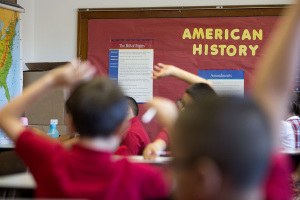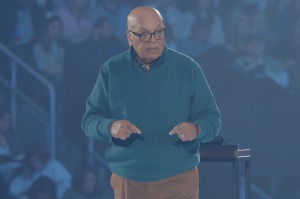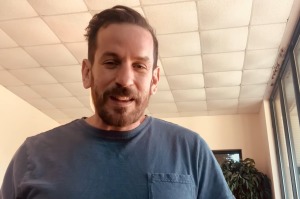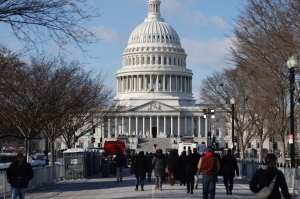Ask Dr. Land: Why do so many young Americans hate their country's heritage?

Question: Why are so many of America’s young people apparently beguiled into despising America’s founding and heritage?
I have had scores of Americans ask me that question in the last few months. My inquisitors have been baffled and perplexed as to why so many of our twenty and thirty- something citizens seem to so readily jettison what my questioners cherish as rich, meaningful, and critically important — an American heritage that has fostered and promoted individual human dignity (“All men are created equal”) with divinely imparted inherent rights (“and endowed by their Creator with certain unalienable rights” including “life, liberty and the pursuit of happiness”).
This priceless heritage, coupled with the Puritan ideal of being “a city on a hill,” lighting the way for the Old World to have a fresh, new birth of freedom, has been cherished and passed on from generation to generation for two and a half centuries, even as that ideal has been secularized down through the years, from Lincoln’s “last, best hope of mankind,” Wilson’s “war to end all wars” and League of Nations’ ideals, and FDR’s “arsenal of democracy” and “Four Freedoms.” And, of course, this American “exceptionalism” suffused JFK’s inaugural address:
. . . the rights of man come not from the generosity of the state, but from the hand of God. . . . We are the heirs of that first revolution. Let the word go forth from this time and place, to friend and foe alike, that the torch has been passed to a new generation of Americans — born in this century, tempered by war, disciplined by a hard and bitter peace, proud of our ancient heritage, and unwilling to witness or permit the slow undoing of those human rights to which this nation has always been committed, and to which we are committed today at home and around the world.
Let every nation know, whether it wishes us well or ill, that we shall pay any price, bear any burden, meet any hardship, support any friend, oppose any foe to assure the survival and the success of liberty.
This much we pledge — and more.
Many Americans, including myself, consider those words perhaps the most eloquent summary of America’s “exceptionalism” ever uttered. It is a doctrine not of rights and privileges, but rather sacrifice and service. “To whom much is given, much is required” (Luke 12:48).
It was this “exceptionalism” that caused a famous immigrant citizen — a “voluntary” American, Henry Kissenger — to explain that America was a country like any other, with “interests” and “spheres of influence,” but that it was also a “cause,” and the cause was “freedom.” When people yearn and strive for freedom, America is obligated to help them the same way the French helped us win our War of Independence.
A majority of Americans have believed this in the past, and at least a plurality of Americans still does. This is why older Americans, and many young ones as well, have been aghast at scores of rioters tearing down statues, not just of Confederate leaders, but of Washington and Jefferson and others.
As I was writing this column, I was reminded of a deeply moving experience I had while I was speaking at a conference on Freedom in Romania, just after they had overthrown the horrifically brutal Communist dictator Ceausescu in 1989. The conference was on how Romania could now install a free and democratically self-governing society with deep respect for human rights — “a government of the people, by the people, for the people.”
I was in a private, one-to-one meeting with the Romanian equivalent of the U.S. Attorney General. He pulled a book off the shelf in his office, opened it up, and started reading in English, “When in the course of human events . . .” — the American Declaration of Independence. After he had read the part, “All men are created equal,” he looked up with tears in his eyes and said, “We want what you have.”
I realized at that moment that I had been guilty of the “sin of familiarity.” We have all heard the shibboleth “familiarity breeds contempt.” I believe far more often it just breeds “familiarity.” We become familiar, blasé if you will, about truly monumental things and fail to sufficiently appreciate just how extraordinary some things really are.
Shame on us as Americans for far too often treating the timeless truths embodied in the Declaration of Independence familiarly when they are indeed priceless and the Revolution those truths ignited in 1776 has deeply impacted people and ignited the fire of liberty in their hearts both here and around the globe. Those founding principles are what inspired Dr. Martin Luther King Jr. to call for his fellow citizens to live up to the ideals spelled out in our founding documents — a call we continue to seek to fulfill for ever greater numbers of our people yet still today.
So why are so many of our young adults rejecting this widely held view which is a truly glorious heritage? Of all men and women, we are most blessed to be heirs of this inspiring legacy. Well, there are two reasons, one nefarious and the other merely scandalous.
The first reason is that for a generation now, too many radicals who reject America’s heritage on ideological and dogmatic grounds, have worked their way into public education, and they have undermined and distorted our heritage. Perhaps the most odious and infamous current example is the New York Times’ “1619 Project” — a destructive attempt to completely re-write American history by declaring that America was “founded” in 1619.
The 1619 project has been eviscerated by serious historian from coast to coast and across generations. My extremely distinguished old Princeton history professor, James McPherson, was devastating in his critique.
Why would people try to foist this historical fiction and such an obviously inaccurate and unhinged from reality interpretation of America’s history on American students?
These people know that in order to dismantle the American constitutional order and replace it with a socialist and/or Marxist society, you must first discredit America’s origins as illegitimate and fatally tainted by racism from the beginning.
In actual fact, the first slaves may have landed on the North American continent in 1619, but the first Puritans didn’t arrive until a year later. The Puritan ideal had far more to do with shaping the American character than slavery. G. K. Chesterton observed in the early 20th century that “America was a nation with the soul of a church.”
People who lose or are denied their history are ripe for revolution. This is more true for America than any other country because America is the only country in the world not based on blood and soil, but upon a set of ideas and ideals embodied in the Declaration of Independence (1776) and codified and implemented in the U.S. Constitution (1787). If we as a people lose our allegiance to these ideals, then centrifugal forces will rend us asunder and America will be Balkanized into several competing conglomerations of states seeking to impersonate nation-states.
The second reason our young adults have increased numbers of their cohort who reject our heritage is that they don’t know a lot. They have been significantly undereducated in our public schools, and they are quite simply mind-numbingly ignorant.
E. D. Hirsch, in a recent interview with the Wall Street Journal (“Bad Teaching Is Tearing America Apart") explains the serious unraveling of American public education at the elementary school level. Hirsch is author of the best-selling book Cultural Literacy: What Every American Needs to Know (1987). This book makes an impassioned plea for American children being taught tens of thousands of specific facts— mainly about Western Civilization — thus opening Mr. Hirsch to charges of “elitism”?
In this interview he reveals that there has been a grievous decline in American education — particularly at the elementary level. After the 1950s American children’s verbal scores began to drop drastically. In the 1950s American children were number 1 in the world. We had dropped to 5th on the International Adult Literacy Survey in the 1970s and 14th in the 1990s. In the 21st century America’s children have dropped from 15th to 24th in reading on International Student assessments.
Mr. Hirsch describes himself as “practically a socialist,” but in his new book How to Educate a Citizen, he updates his earlier volume and indicts American public education for abject failure. Mr. Hirsch argues vigorously for elementary schools as “culture makers” and that America desperately need to create an “American ethnicity” and that elementary schools should exist “to make children into good citizens.”
American educators have either brainwashed or seriously under-served a whole generation of American young adults.
I can think of no better way to honor and celebrate Constitution Day (September 17) than for Americans to rededicate themselves to restoring our unique and invaluable heritage of liberty and freedom to the common experience and cognition of every American citizen.
Dr. Richard Land, BA (magna cum laude), Princeton; D.Phil. Oxford; and Th.M., New Orleans Baptist Theological Seminary, was president of the Southern Baptists’ Ethics & Religious Liberty Commission (1988-2013) and has served since 2013 as president of Southern Evangelical Seminary in Charlotte, NC. Dr. Land has been teaching, writing, and speaking on moral and ethical issues for the last half century in addition to pastoring several churches. He is the author of The Divided States of America, Imagine! A God Blessed America, Real Homeland Security, For Faith & Family and Send a Message to Mickey.





























